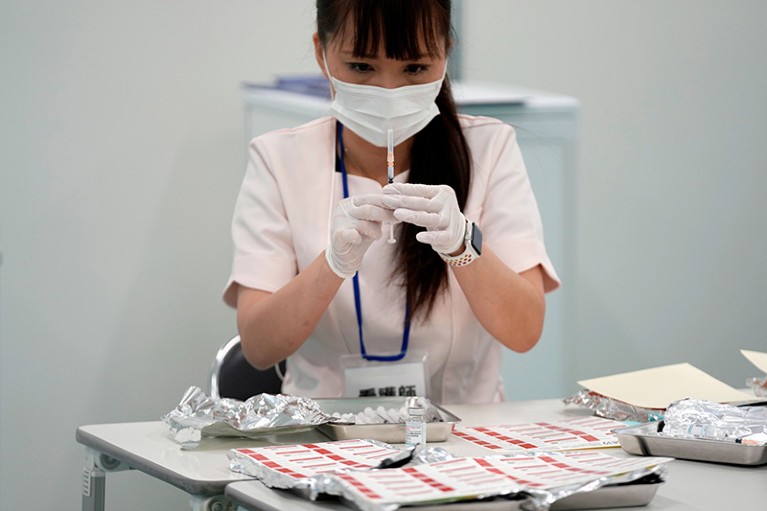[ad_1]

A new Japanese research effort will work on vaccines for infectious diseases, including coronaviruses, monkeypox and dengue virus.Credit: Eugene Hoshiko/AP/Shutterstock
After recognizing that Japan was slow to develop vaccines for COVID-19, the government has pledged to invest US$2 billion in a vaccine-research initiative to ensure that the country is ready to respond promptly to future epidemics.
The Strategic Center of Biomedical Advanced Vaccine Research and Development for Preparedness and Response (SCARDA) will initially invest in vaccine research for eight pathogens, including coronaviruses, monkeypox, dengue virus and Zika virus, using a range of technologies for vaccine delivery, such as mRNA technology, viral vectors and recombinant proteins.
Japan has been “too slow to catch up” with the rest of the world in making COVID-19 vaccines, says Ken Ishii, a University of Tokyo vaccinologist who is also part of the central research centre selected by SCARDA. The country’s three most advanced COVID-19 vaccine candidates are still in late-stage clinical trials and none is approved for use.
In recognition of this delay, the Japanese government established SCARDA in March; the centre will launch formally in November, says Ishii. The government has realized that developing vaccines is complicated and takes resources, and has given the field a boost, says Toshihiro Horii, a vaccinologist at Osaka University. “That is a tremendously huge amount of money,” he says.
The initiative will bring together researchers from across Japan, says Yoshihiro Kawaoka, a virologist at the University of Tokyo, and head of the SCARDA central research centre. “That is unique, at least for Japan.”
Hundred-day goal
SCARDA’s aim will be to produce diagnostic tests, treatments and vaccines ready for large-scale production within the first 100 days of a pathogen with pandemic potential being identified. This 100-day mission was first proposed by the United Kingdom in 2021, and backed by the other countries in the G7 group of wealthy nations. Similar initiatives include the US Biomedical Advanced Research and Development Agency (BARDA); this coordinates the development of vaccines, drugs and diagnostics in response to public-health emergencies, including pandemics, and invested in several COVID-19 vaccines.
“Since SCARDA is a new organization, it has much to learn from BARDA,” and other initiatives funding vaccines such as the Coalition for Epidemic Preparedness Innovations, says Michinari Hamaguchi, director general of SCARDA.
Two of SCARDA’s first approved projects aim to develop universal coronavirus vaccines and vaccines against a group of coronaviruses related to severe acute respiratory syndrome (SARS), such as SARS-CoV-2. Another project will create a fast-track system for evaluating vaccine candidates.
Japan’s centre will operate with around 30 members of staff and funding to last 5 years. Of the allotted $2 billion, $1.2 billion will go to vaccine research and development projects, and $400 million will be used to support start-ups in drug development. Another $400 million will be spent on setting up a virtual network of centres of excellence for basic research in vaccine science, and testing vaccine candidates in early-stage trials. The goal is “to find seeds for future vaccines”, says Kawaoka.
In addition to the central research centre based in Tokyo, there will be four core institutes — Osaka University, Nagasaki University, Hokkaido University and Chiba University. Another five institutions will provide support services such as animal models.
Horii, who leads several clinical trials for malaria and is not involved with SCARDA, says that the current bottleneck in vaccine development in Japan is the translation of research into clinical practice. SCARDA will have to move beyond basic science to develop expertise in taking vaccine candidates through clinical trials, he says. “We have many vaccinologists in Japan, but the majority of them are basic researchers.”
[ad_2]
Source link

